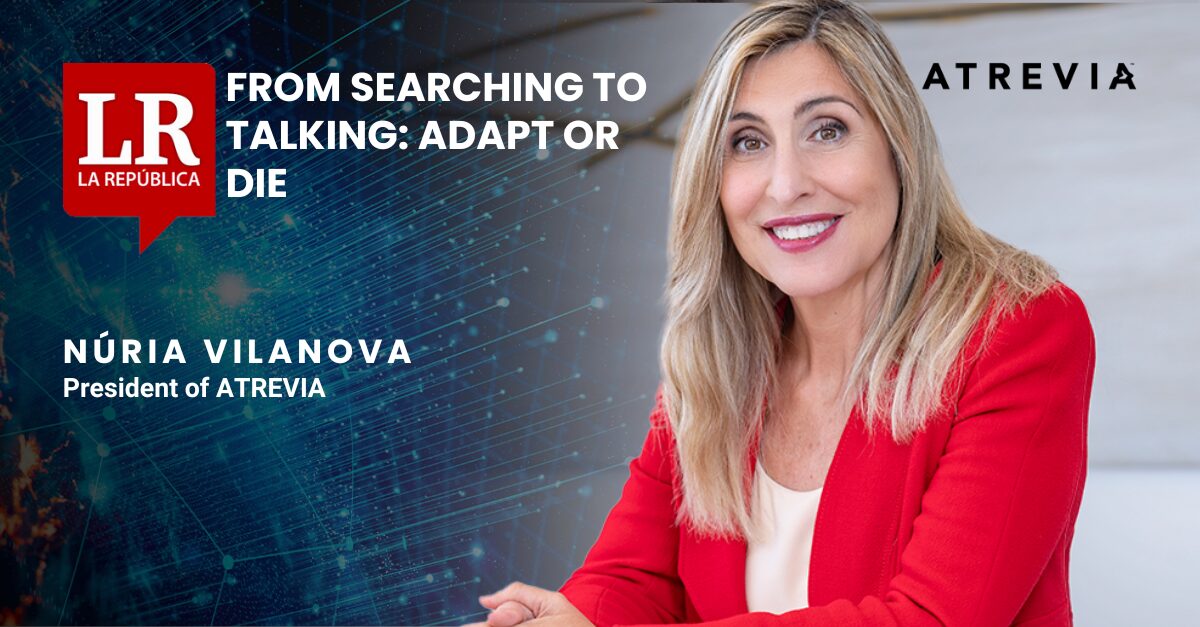
La República, one of the most important economic and financial newspapers in Colombia, has published the latest article by our president, Núria Vilanova, entitled “From searching to talking: adapt or die”.
Communication is going through a unique moment, as it was when Google appeared at the end of the 20th century. If search engines forced us to rethink our communication and marketing strategies, the arrival of AI-based tools such as ChatGPT, Perplexity, Copilot or Claude make obsolete what we took for granted yesterday, when traffic to our websites originated in search engines and social networks.
That is changing radically. One of the most important digital media, Financial Times, has detected that in 2024 the traffic coming from Facebook has fallen 21%; from X, 34%; from LinkedIn, 27% and from Tik Tok, 80%. Meanwhile, traffic from Perplexity has multiplied by seven and, in the case of ChatGPT, by almost 100. Although in absolute numbers, the traffic generated by AI is still much lower than that of other platforms, the trend is irreversible: we have gone from searching -googling- to conversing.
A change with a huge impact on the way we communicate. And it’s just the beginning. The next step is for these AI-based tools to incorporate the option to purchase products directly from the chat, as part of our conversation. This is a challenge to the e-commerce leadership of Amazon, the second largest search engine in the world after Google, or Walmart, which, for now, are blocking these engines from extracting information from their products while they accelerate the development of their own AI solutions.
It’s time to reinvent ourselves, but we must know how. The consulting firm I founded 40 years ago has decided to be a pioneer, working on a rethink of the presence of brands on the Internet in two directions: optimizing the positioning of products and content of the companies that trust us in these AI tools and orienting the redesigning of websites to conversational models.
Before, it was key to unravel the algorithms of search engines; today, it is necessary to know how these natural language processors build conversations. We are facing a new channel that is more complex than a search engine and that requires formulating the information on our websites in a different way for a satisfactory interaction between brands and consumers through these tools. It is useless to have the most spectacular web design if these generative AI engines ignore us.
At the same time, we must adapt our websites to the user experience that prefers to chat rather than search, as the German newspaper Bild has already done by including the possibility of chatting with its own AI agent to access information and services without having to browse the website itself.
When we shop on the Internet, we will no longer search: we will converse. That’s why we are researching sectors where answers will be key, such as health, energy and telecommunications. It is not theory, they are real cases because the goal is that, when a user asks for the most complete cell phones for less than 500 euros, the most convenient electricity tariff or where to have an eye operation, the brands that have been prepared appear as the best option, and not only in the first answer, but in the whole conversation.
This paradigm shift, far from being an obstacle, is an opportunity to get ahead of the competition; evolving towards websites that make it easier for our brands to gain prominence in this new digital ecosystem. To do this, we must overcome the double challenge of making these AI-based tools talk about us -because otherwise it is as if your brand does not exist-; and that they talk better than our competition. Undoubtedly, an exciting challenge.